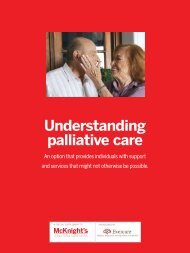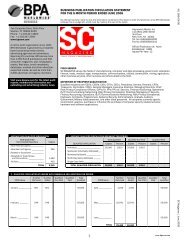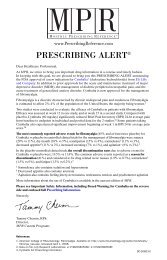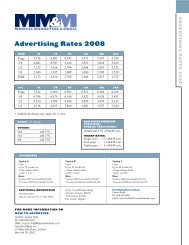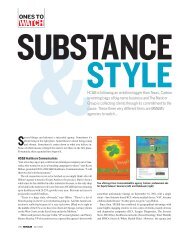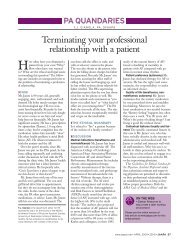Review - Haymarket Media Group
Review - Haymarket Media Group
Review - Haymarket Media Group
Create successful ePaper yourself
Turn your PDF publications into a flip-book with our unique Google optimized e-Paper software.
in Breast Cancer<br />
The following is an invited report based on abstracts presented at recent oncology meetings.<br />
Bevacizumab With Docetaxel or Docetaxel With<br />
Placebo as First-Line Therapy in Locally<br />
Recurrent or Metastatic Breast Cancer: The<br />
AVADO Study<br />
The AVADO study, a randomized, double-blind, placebo-controlled,<br />
phase III trial, evaluated the combination<br />
of bevacizumab plus docetaxel as first-line therapy in<br />
patients with locally recurrent or metastatic breast cancer.<br />
A previous study had demonstrated superior progression-free<br />
survival (PFS) for bevacizumab plus paclitaxel<br />
compared with paclitaxel alone.<br />
Patient eligibility criteria included HER2-negative,<br />
inoperable locally recurrent or metastatic breast cancer;<br />
no prior chemotherapy for advanced disease; ECOG PS<br />
0-1; adequate left ventricular ejection fraction (LVEF),<br />
and no CNS metastases. From March 2006 to April 2007,<br />
researchers in 24 countries randomized 736 patients to<br />
docetaxel 100 mg/m2 plus placebo or docetaxel plus<br />
bevacizumab at either 7.5 mg/kg or 15 mg/kg.<br />
Docetaxel was administered every 3 weeks for up to 9<br />
cycles. Bevacizumab or placebo was administered every<br />
3 weeks until disease progression or unacceptable toxicity.<br />
PFS was the primary end point.<br />
With a median follow-up of approximately 11<br />
months, both bevacizumab-containing arms demonstrated<br />
statistically significantly superior PFS compared<br />
with docetaxel alone (bevacizumab 7.5 mg/kg,<br />
P=0.0035; bevacizumab 15 mg/kg; P=0.0001). The overall<br />
response rate (CR + PR) was 44.4% in the docetaxel<br />
alone arm vs 55.2% (P=0.0295) and 63.1% (P=0.0001) in<br />
the bevacizumab 7.5 mg/kg and 15 mg/kg arms, respectively.<br />
Grade ≥3 adverse events for the docetaxel alone,<br />
bevacizumab 7.5 mg/kg, and bevacizumab 15 mg/kg<br />
arms were 67.0%, 74.8%, and 74.1%, respectively, and<br />
included GI perforation 0.9%, 0.4%, and 0.4% and febrile<br />
neutropenia 12.0%, 15.2%, and 16.6%, respectively.<br />
Overall survival rate data were immature at the time of<br />
the report.<br />
Results indicate that both doses of bevacizumab in<br />
combination with docetaxel significantly improved PFS<br />
and response rate when compared with docetaxel alone.<br />
Safety results were comparable in the two bevacizumab<br />
arms, and although toxicities were slightly increased relative<br />
to the control group, no new safety concerns<br />
emerged.<br />
Miles D, et al. J Clin Oncol. 2008;26(May 20 suppl). Abstract LBA1011.<br />
By Beverly Moy, MD, MPHTrends<br />
8 The American Journal of Hematology/Oncology<br />
A Phase III Study of Capecitabine vs<br />
Capecitabine Plus Trastuzumab in HER2+<br />
Patients With Metastatic Breast Cancer That<br />
Progressed During Trastuzumab Treatment<br />
(GBG 26/BIG 3-05)<br />
Agreement is lacking on whether trastuzumab treatment<br />
should be continued beyond disease progression. The<br />
German Breast <strong>Group</strong> (GBG) and the Breast<br />
International <strong>Group</strong> (BIG) conducted a treatment<br />
beyond progression (TBP) phase III study, GBG 26/BIG<br />
3-05, of trastuzumab therapy.<br />
Eligible patients had HER2+, locally advanced or<br />
metastatic breast cancer that progressed during<br />
trastuzumab treatment with or without adjuvant and/or<br />
first-line metastatic chemotherapy. Patients were prospectively<br />
randomized to receive either capecitabine<br />
(2500 mg/m 2 on days 1-14, every 21 days) or capecitabine<br />
plus continuation of trastuzumab (6 mg/kg, every 3<br />
weeks). The primary end point was time to progression.<br />
The slowly accruing trial was closed prematurely after<br />
the registration of lapatinib.<br />
Between January 2004 and May 2007, a total of 156<br />
patients were randomized. Of these, 78 received capecitabine,<br />
and 78 received capecitabine plus trastuzumab.<br />
Patients were stratified according to previous treatment:<br />
taxane/trastuzumab as first-line therapy (111 patients),<br />
taxanes/trastuzumab as adjuvant therapy (3 patients),<br />
trastuzumab alone or without taxanes as first-line treatment<br />
(42 patients). Of note, 75 patients (48.1%) had<br />
received anthracyclines.<br />
Visceral metastasis was observed in 119 patients<br />
(76.3%). At the time of the report, median follow-up was<br />
11.8 months, and analysis had revealed a PFS of 5.6<br />
months with 53 events in the capecitabine group and 8.5<br />
months with 48 events in the capecitabine plus<br />
trastuzumab group (HR=0.71). In patients receiving<br />
capecitabine or capecitabine plus trastuzumab, respectively,<br />
brain metastases were seen in 4 patients vs 7<br />
patients; overall survival was 19.9 months with 31<br />
events vs 20.3 months with 26 events (HR=0.79); crude<br />
response rates were 24.6% vs 49.1%; and primary progressions<br />
were seen in 26.3% vs 16%.<br />
Reported grade 3/4 toxicities for capecitabine and<br />
capecitabine plus trastuzumab, respectively, included<br />
neutropenia, 3.3% vs 6.3%; febrile neutropenia, 0% vs<br />
0%; vomiting, 6.0% vs 1.6%; diarrhea, 20.9% vs 14.8%;





